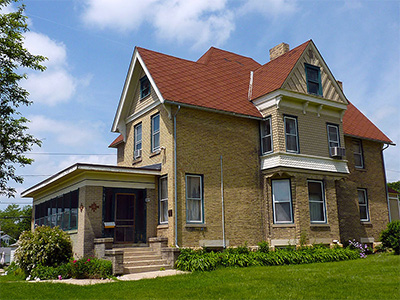
BY SARAH PULLIAM BAILEYReligion News Service
A federal judge in Madison, Wisconsin, has ruled that clergy’s exemption from paying taxes on housing is not constitutional, an exemption currently applied to an estimated 44,000 ministers, priests, rabbis, imams and others. If the ruling stands, some clergy members could experience an estimated 5 to 10 percent cut in take-home pay.
U.S. District Court’s Judge Barbara Crabb ruled Nov. 22, 2013, in favor of the Freedom From Religion Foundation, saying the exemption violates the establishment clause because it “provides a benefit to religious persons and no one else, even though doing so is not necessary to alleviate a special burden on religious exercise.”
The case decided in the U.S. District Court for the Western District of Wisconsin will likely be appealed to the 7th Circuit, which could reverse the decision. If the 7th Circuit lets the ruling stand, then it could become precedent for courts in Wisconsin, Illinois and Indiana. Earlier this month, the 7th Circuit barred the enforcement of the contraceptive mandate, a church-state issue being considered by the Supreme Court.
If the court decision stands, it could have a significant impact on clergy income. Clergy, who make an average of about $50,000 per year, have access to some additional income through tax-free housing.
A clergy member who receives a salary of $50,000 receives another a third of income from a housing allowance, the person could spend $16,000 tax-free on housing, essentially earning $66,000. The cut in taxes ($4,000 in this case), would mean an 8 percent cut in salary.
The
Hosana-Tabor v EEOC case decided last year that a teacher could be considered a “minister,” so people using the exemption could extend beyond those who people traditionally consider to be clergy. EXEMPTION OVERTURNED: The parsonage of First Methodist Church, Monroe, Wisconsin. A judge of the U.S. District Court in nearby Madison, Wisconsin, ruled November 22, 2013, that clergy’s exemption from paying taxes on housing is not constitutional. Supporters of the exemption, which covers an estimated 44,000 ministers, priests, rabbis, imams and other clergy, promise to appeal. [James Steakley/Wikimedia Commons]">
EXEMPTION OVERTURNED: The parsonage of First Methodist Church, Monroe, Wisconsin. A judge of the U.S. District Court in nearby Madison, Wisconsin, ruled November 22, 2013, that clergy’s exemption from paying taxes on housing is not constitutional. Supporters of the exemption, which covers an estimated 44,000 ministers, priests, rabbis, imams and other clergy, promise to appeal. [James Steakley/Wikimedia Commons]">
The exemption is worth about $700 million per year to the U.S. government, according to the Congressional Joint Committee on Taxation’s
Estimate of Federal Tax Expenditure.
Judge Crabb ruled that the law provides that the gross income of a “minister of the gospel” does not include:
“the rental allowance paid to him as part of his compensation, to the extent used by him to rent or provide a home and to the extent such allowance does not exceed the fair rental value of the home, including furnishings and appurtenances such as a garage, plus the cost of utilities.”
Peter J. Reilly, a contributor to
Forbes magazine’s website, writes (http://onforb.es/1duaIs4) that the “stunning decision” applies to an exclusion that goes back to 1921.
“I’m not sure what Congress could do in this instance,” he said. “There is strong clergy influence on both sides of the aisle though, so there is a good chance that Congress will at least try to make it look like it has done something.”
The housing allowances of pastors in Wisconsin remain currently unaffected as the judge has stayed the ruling until the appeals are exhausted.
“The idea goes back to the traditional way churches paid clergy when many churches own parsonages,” said Tobin Grant, a political science professor at Southern Illinois University. “Over time, fewer churches owned parsonages and instead gave clergy housing allowances, which were also treated as tax-free. The difference, however, was that these were regular salaries that now had an exclusion. Part could be tax-free, part couldn’t. So, why not give a pastor a huge housing allowance, which is tax free?”
The ruling addresses the housing allowance while parsonages are still exempt. The law’s tax exemption has been contested since a decade-old dispute between the IRS and the Rev. Rick Warren, a megachurch pastor in California.
In 2002, the IRS attempted to charge Warren back taxes after he claimed a housing allowance of more than $70,000, a federal court case he eventually won but led to Congress clarifying the rules for housing allowance. The allowance is limited to one house, either the fair market rental value of the house or the money actually spent on housing.
“May we say hallelujah! This decision agrees with us that Congress may not reward ministers for fighting a ‘godless and anti-religious’ movement by letting them pay less income tax. The rest of us should not pay more because clergy pay less,” said the co-presidents of the Freedom From Religion Foundation, Annie Laurie Gaylor and Dan Barker.
The Southern Baptist Convention’s Ethics and Religious Liberty Commission and GuideStone Financial Resources plan to fight for the exemption.
“The clergy housing allowance isn’t a government establishment of religion, but just the reverse,” said Russell Moore, president of ERLC. “The allowance is neutral to all religions. Without it, clergy in small congregations of all sorts would be penalized and harmed.”
Earlier this year, the federal government offered the Freedom From Religion Foundation a tax break they didn’t want. Atheists are challenging non-profit tax-exempt statuses in a Kentucky court.
Judge Crabb, who decided the housing allowance case, also ruled in 2010 that the National Day of Prayer was unconstitutional. That ruling was later struck down on appeal when a three-judge panel of the Chicago-based 7th U.S. Circuit Court of Appeals unanimously ruled that the Freedom From Religion Foundation – also the plaintiff in the 2010 case – lacked legal standing to file suit over the matter.
-- with additional reporting by Adventist Review staff